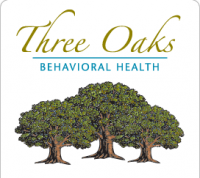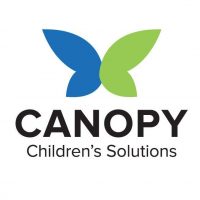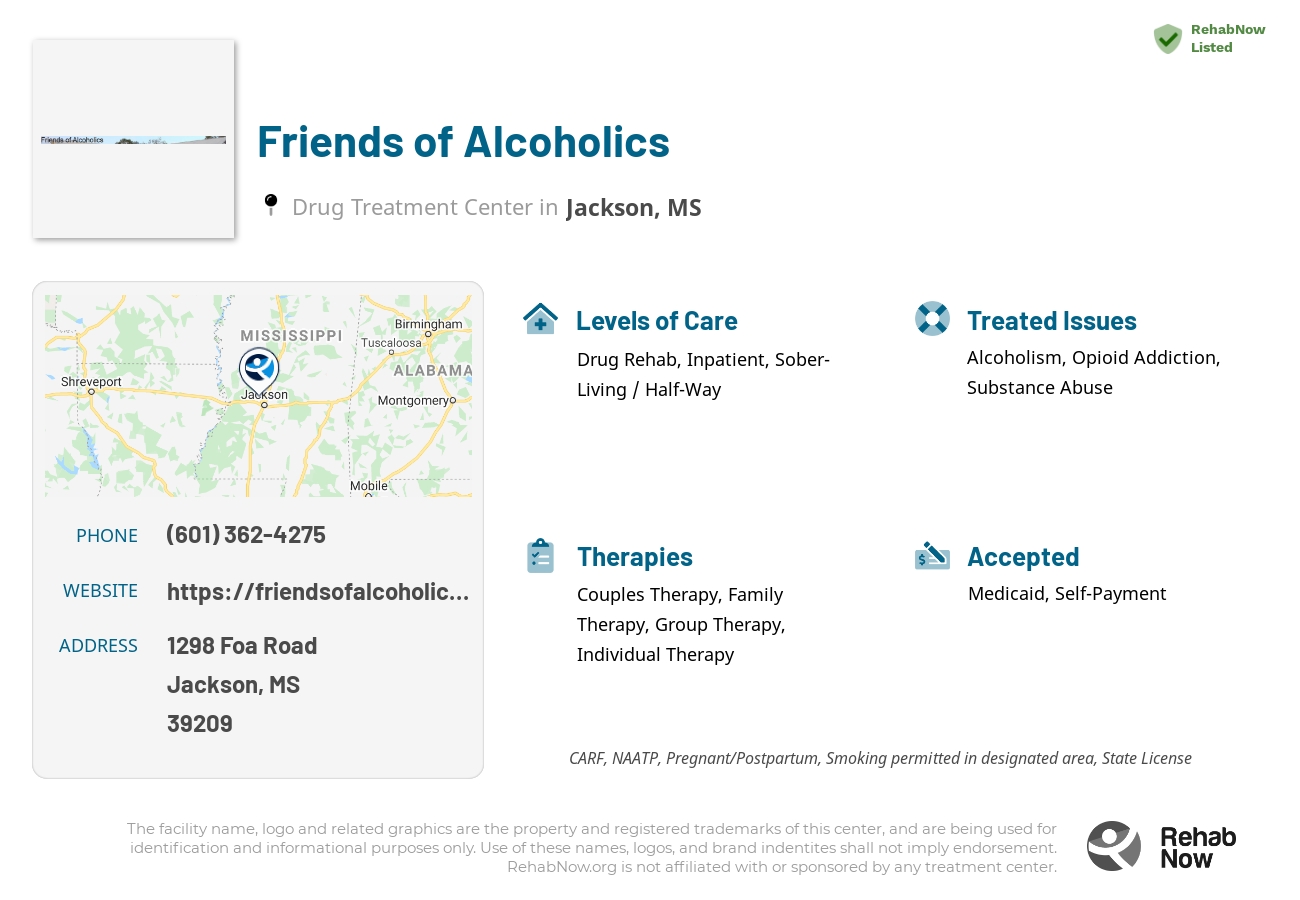
Friends of Alcoholics
Drug Rehab Center in Jackson, Mississippi
- Substance Abuse
- Opioid Addiction
- Drug Addiction
- Alcoholism
Friends of Alcoholics is an Addiction Treatment Facility located in Jackson, MS specializing in alcohol and opioid addiction, substance abuse, and drug addiction, with 36 beds and a team of qualified professionals to provide individualized treatment plans, group/family therapy, 12-step meetings, educational resources, life skills training, relapse prevention and aftercare services.
About This Mississippi Facility
Friends of Alcoholics is a drug treatment facility located in Jackson, Mississippi. While the exact year of its founding is not available, Friends of Alcoholics (FOA) has been providing assistance to individuals struggling with addiction and substance abuse for several years. FOA is an alcoholism, opioid addiction, substance abuse, and drug addiction treatment facility that offers various levels of care, including drug rehab, inpatient services, sober-living/half-way homes, and residential programs. The facility has a total capacity of 36 beds, providing a supportive environment for individuals seeking recovery from addiction.
Friends of Alcoholics utilizes a comprehensive approach to help individuals overcome their addiction and achieve lasting sobriety. Their services encompass a range of treatment methods designed to address alcoholism, opioid addiction, and substance abuse issues. Through therapy and counseling sessions, they aim to identify underlying causes and triggers for addictive behaviors while equipping patients with healthy coping mechanisms. FOA also provides educational programs on addiction awareness and prevention. With their individualized treatment plans and supportive environment, Friends of Alcoholics offers patients the tools they need to embark on their journey towards recovery from alcoholism and substance abuse.
Genders
Ages
Modality
Additional
Conditions and Issues Treated
People who abuse drugs are likely to suffer from an addiction, which can cause serious health problems. When it comes to helping drug abusers get sober, there are many options to choose from. It is essential to state that there is no “”correct”” way of doing things. People are different, and they need different types of help to get over their addiction.
Many people who struggle with opioid addiction need to attend specific programs like methadone , Suboxone or Vivitrol clinics.
These types of programs will provide the patient with legal, prescription medications that can help them overcome their cravings for illegal opioids like heroin or fentanyl . If the patient has a chronic condition like Hepatitis C, they must undergo treatment before they can begin taking these medications.
Levels of Care Offered at Friends of Alcoholics
This center offers a variety of custom treatment tailored to individual recovery. Currently available are Drug Rehab, Inpatient, Residential, Sober-Living / Half-Way, with additional therapies available as listed below.
Individuals who are suffering from severe addiction or have a high risk for dangerous health concerns are often recommended to receive inpatient treatment.
Choosing to enter an inpatient treatment program is beneficial for people who are suffering from severe addiction, or who have a high risk for dangerous health concerns.
Inpatient treatment is beneficial for:
- People who have a history of severe withdrawal.
- People who have attempted to overcome addiction on their own without success.
- People who have a history of relapse, or have recently relapsed.
- People at risk for drug overdose or withdrawal-related complications.
- People with medical conditions that are worsened by drug or alcohol use.
Sober Living Home (SLH) is a term used to describe houses where people recovering from addiction can stay. The goal of these places is to provide immediate support and protection that the addict needs and force them to live a life free from substance abuse.
SLH’s typically allow the addict to live there for 30, 60, or 90 days. This is intended to enable the addict time to develop a foundation of “sobriety,”; allowing them to adjust to living without the substance while building new life skills. During this time, addicts also typically attend regular addiction, education classes.
Residential treatment programs are those that offer housing and meals in addition to substance abuse treatment. Rehab facilities that offer residential treatment allow patients to focus solely on recovery, in an environment totally separate from their lives. Some rehab centers specialize in short-term residential treatment (a few days to a week or two), while others solely provide treatment on a long-term basis (several weeks to months). Some offer both, and tailor treatment to the patient’s individual requirements.
Therapies & Programs
Therapy sessions focused on the individual addict can provide much-needed guidance as they work toward overcoming their addiction. These types of sessions typically involve guidance from a therapist, who will help addicts identify and process their feelings and cravings.
During these sessions, addicts may develop plans for coping with the triggers that typically lead to relapse and learn how to avoid those triggers during their recovery process.
If you are looking for drug recovery, couples therapy can be a great option. This type of therapy can help rebuild trust and joy in relationships that may have been damaged by addiction. It can also help reduce the dysfunctional behavior in a relationship that may trigger addiction. A patient’s partner will be involved in the process. They can also benefit from therapy, especially if they are trying to live with an addict.
The main goal of family therapy for drug addiction is to create an environment where communication can occur without judgment, hostility, or blame that often occurs within a family.
Family therapy is a type of group problem-solving that aims to improve communication and relationships between the patient, their family, and sometimes friends. The therapist is with the family as they learn to communicate with each other differently, especially with the addict when s/he is using.
The family can learn to reduce their enabling behavior or rally together and support each other during tough times. The patient also learns how to deal with their addiction and maintain sobriety while interacting with the family.
Different types of addiction treatment services are available. Within this article, group therapy is of interest due to its high success rate compared to individual therapy. Group therapy settings are beneficial because they allow recovering addicts to build a strong support network.
Benefits of group therapy are:
- Reduces feelings of isolation
- Immediate access to social support in the form of fellow addicts in recovery
- Lowers risk of relapse
- Increases rate of sobriety
- Builds coping skills that can be applied to everyday life
Payment Options Accepted
For specific insurance or payment methods please contact us.
Additional Details
Specifics, location, and helpful extra information.
Jackson, Mississippi 39209 Phone Number(601) 362-4275 Meta DetailsUpdated November 25, 2023
Staff Verified
Patient Reviews
There are no reviews yet. Be the first one to write one.
Jackson, Mississippi Addiction Information
Mississippi has one of the highest rates of drug and alcohol abuse-related deaths. Approximately 350,000 residents use illicit drugs every year while another 108,000 abuse alcohol. In one year, doctors in Mississippi prescribed 76.8 opioid prescriptions for every 100 persons. This compares to the national rate of 51.4 prescriptions.
Jackson, Mississippi has some of the highest rates of drug overdose deaths in the country. The city is home to several major highways, which make it easy for dealers to bring their products into the city. In 2016, Jackson had a drug overdose death rate of 24.8 per 100,000 people. There are several drug and alcohol rehabilitation centers in Jackson. Some focus on outpatient care while others offer inpatient treatment.
Treatment in Nearby Cities
- Ridgeland, MS (9.9 mi.)
- Bay Springs, MS (67.5 mi.)
- Picayune, MS (137.9 mi.)
- Winona, MS (78.9 mi.)
- Meadville, MS (76.0 mi.)
Centers near Friends of Alcoholics


The facility name, logo and brand are the property and registered trademarks of Friends of Alcoholics, and are being used for identification and informational purposes only. Use of these names, logos and brands shall not imply endorsement. RehabNow.org is not affiliated with or sponsored by Friends of Alcoholics.





